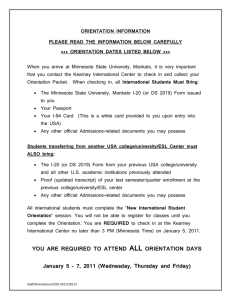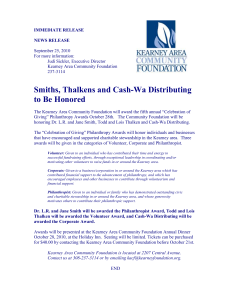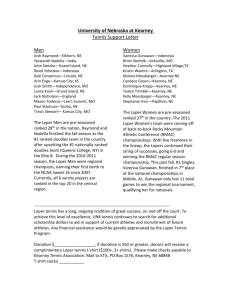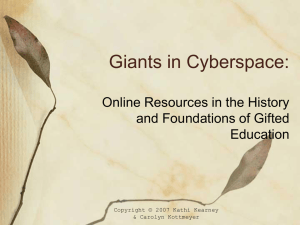Indecent Exposure - Hoagies' Gifted Education Page
advertisement
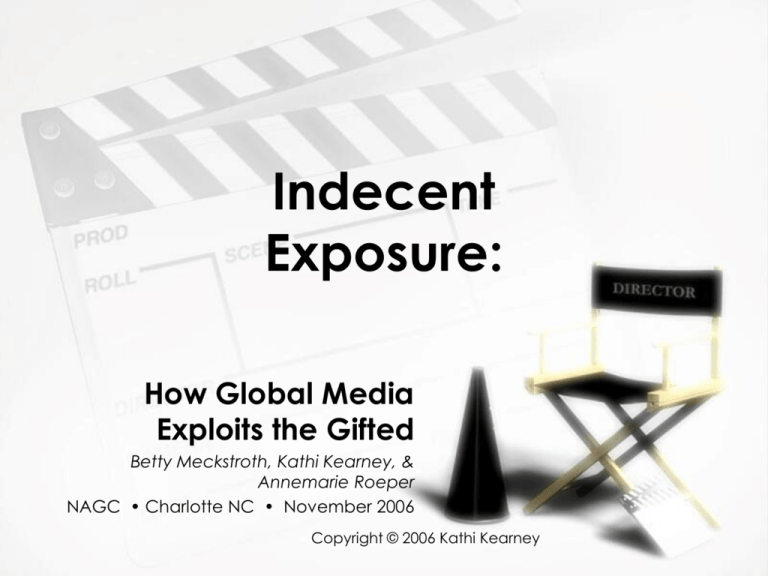
Indecent Exposure: How Global Media Exploits the Gifted Betty Meckstroth, Kathi Kearney, & Annemarie Roeper NAGC • Charlotte NC • November 2006 Copyright © 2006 Kathi Kearney Gifted Children & Privacy » “Those who test above 180 IQ are characterized by a strong desire for personal privacy. They seldom volunteer information about themselves. They do not like to have attention called to their families and homes. They are reluctant to impart information concerning their plans, hopes, convictions, and so forth.” Hollingworth, L. S. (1942). Children above 180 IQ. Yonkers-on-Hudson: World Book Company. (p. xvi) Copyright © 2006 Kathi Kearney 100 Years of the Media’s Great Prodigy Story: A One-Note Song » Child is usually male » Child demonstrates an astonishing achievement or a clever trick or gimmick » Story either portrays child’s negative qualities, or goes overboard to demonstrate that in all other ways, the child is “just an ordinary kid” » Emphasizes the sensational » Stories about the same children are recycled over and over » Mass marketing strategies determine the story’s perspective Copyright © 2006 Kathi Kearney The William James Sidis Example: A Cautionary Tale Copyright © 2006 Kathi Kearney Copyright © 2006 Kathi Kearney Remember the Media’s Roles » Journalism Telling all sides of a story Balance Interpretation within a factual realm » Protection of a free press » Marketing & selling their product Copyright © 2006 Kathi Kearney Why Do Parents of Gifted Children Talk to the Media? » “Educator Parents” Genuine desire to help the public understand giftedness » “Stage Parents” Publicity seekers » “Scholarship Parents” Belief that media exposure will help a lowerincome child secure a scholarship » “Clueless Parents” Those who talk without weighing the issues Copyright © 2006 Kathi Kearney Why Do Schools Talk to the Media About Gifted Children? » Showcasing a school or program » Taking credit for a child’s accomplishments » Winning an academic or arts competition » Defending an adminstrative, policy, or educational decision Copyright © 2006 Kathi Kearney Dangers of 21st Century “New Media” » Newspapers’ Internet presence makes local stories global ones “All news is global” » Newspaper & magazine “talk back” or “comment” features, blogs, & podcasts allow anyone in the world to say anything publicly » Mapquest, Google Earth, & 411.com give stalkers a direct route, complete with maps & photos, to the child’s home and school » Archival features are instantaneous and probably forever Copyright © 2006 Kathi Kearney » Archives, search engines, databases, etc. can be combined to yield even more information » MySpace & other social networking sites allow the individual to compromise his or her own privacy » New media tends toward the sensationalistic » 21st century technologies mitigate against privacy even for those who never have press coverage » New media allows governments & others to easily conduct surveillance Copyright © 2006 Kathi Kearney How to Talk to the Media » Remember that you can always say no » Ask for time to consider whether or not to do the interview » Understand the media’s role » Think before you speak » Treat everything you say as if it is on the record » Always respond to the “fact checkers” Copyright © 2006 Kathi Kearney Responding to Negative or Inaccurate Media Accounts » Consider carefully if the best response is no response » Contact the editor personally » Word carefully any letters to the editor » Ask for op-ed space » Issue a press release or call a press conference » Consider the ramifications of any “spin” you try to use Copyright © 2006 Kathi Kearney Working with the Media » What you CAN do: Educate the reporter Build an ongoing relationship with a reporter Refer the reporter to other people Control access to a desired interviewee, event, or setting Set parameters for an interview Attempt to correct errors during the fact-checking phase » What you CAN’T do: Read the story before it is published (usually) Control the headline, photos, or cover Control any comments made in online forums related to the story Control release of the story to other media or publications Control access to your own personal information (including unlisted phone numbers) Predict public response Copyright © 2006 Kathi Kearney When in Doubt. . . » Take Nancy Reagan’s advice: “Just say no!” Copyright © 2006 Kathi Kearney

